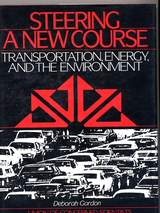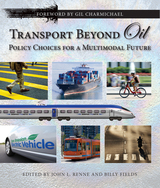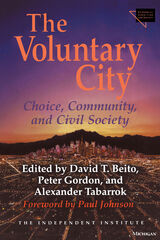3 books by Gordon, Deborah

Steering a New Course
Transportation, Energy, and the Environment
Deborah Gordon
Island Press, 1991
Steering a New Course offers a comprehensive survey and analysis of America's transportation system -- how it contributes to our environmental problems and how we could make it safer, more efficient, and less costly.
[more]

Transport Beyond Oil
Policy Choices for a Multimodal Future
Edited by John L. Renne and Billy Fields, Foreword by Gilbert E. Carmichael
Island Press, 2012
Seventy percent of the oil America uses each year goes to transportation. That means that the national oil addiction and all its consequences, from climate change to disastrous spills to dependence on foreign markets, can be greatly reduced by changing the way we move. In Transport Beyond Oil, leading experts in transportation, planning, development, and policy show how to achieve this fundamental shift.
The authors demonstrate that smarter development and land-use decisions, paired with better transportation systems, can slash energy consumption. John Renne calculates how oil can be saved through a future with more transit-oriented development. Petra Todorovitch examines the promise of high-speed rail. Peter Newman imagines a future without oil for car-dependent cities and regions. Additional topics include funding transit, freight transport, and nonmotorized transportation systems. Each chapter provides policy prescriptions and their measurable results.
Transport Beyond Oil delivers practical solutions, based on quantitative data. This fact-based approach offers a new vision of transportation that is both transformational and achievable.
The authors demonstrate that smarter development and land-use decisions, paired with better transportation systems, can slash energy consumption. John Renne calculates how oil can be saved through a future with more transit-oriented development. Petra Todorovitch examines the promise of high-speed rail. Peter Newman imagines a future without oil for car-dependent cities and regions. Additional topics include funding transit, freight transport, and nonmotorized transportation systems. Each chapter provides policy prescriptions and their measurable results.
Transport Beyond Oil delivers practical solutions, based on quantitative data. This fact-based approach offers a new vision of transportation that is both transformational and achievable.
[more]

The Voluntary City
Choice, Community, and Civil Society
David T. Beito, Peter Gordon, and Alexander Tabarrok, Editors
University of Michigan Press, 2002
The rise and decline of American civic life has provoked wide-ranging responses from all quarters of society. Unfortunately, many proposals for improving our communities rely on renewed governmental efforts without a similar recognition that the inflexibility and poor accountability of governments have often worsened society's ills. The Voluntary City investigates the history of large-scale, private provision of social services, the for-profit provision of urban infrastructure and community governance, and the growing privatization of residential life in the United States to argue that most decentralized, competitive markets can contribute greatly to community renewal.
Among the fascinating topics covered are: how mutual-aid societies in America, Great Britain, and Australia provided their members with medical care, unemployment insurance, sickness insurance, and other social services before the welfare state; how private law, known historically as the law merchant, is returning in the form of arbitration; and why the rise of neighborhood associations represents the most comprehensive privatization occurring in the United States today.
The volume concludes with an epilogue that places the discoveries of The Voluntary City within the theory of market and government failure and discusses the implications of these discoveries for theories about the private provision of public goods. A refreshing challenge to the position that insists government alone can improve community life, The Voluntary City will be of special interest to students of history, law, urban life, economics, and government.
David T. Beito is Associate Professor of History, University of Alabama. Peter Gordon is Professor in the School of Policy, Planning, and Development and Department of Economics, University of Southern California. Alexander Tabarrok is Vice President and Research Director, the Independent Institute.
[more]
READERS
Browse our collection.
PUBLISHERS
See BiblioVault's publisher services.
STUDENT SERVICES
Files for college accessibility offices.
UChicago Accessibility Resources
home | accessibility | search | about | contact us
BiblioVault ® 2001 - 2024
The University of Chicago Press









